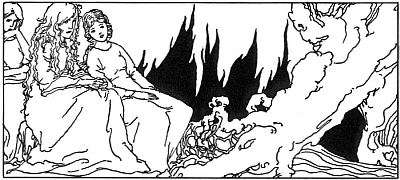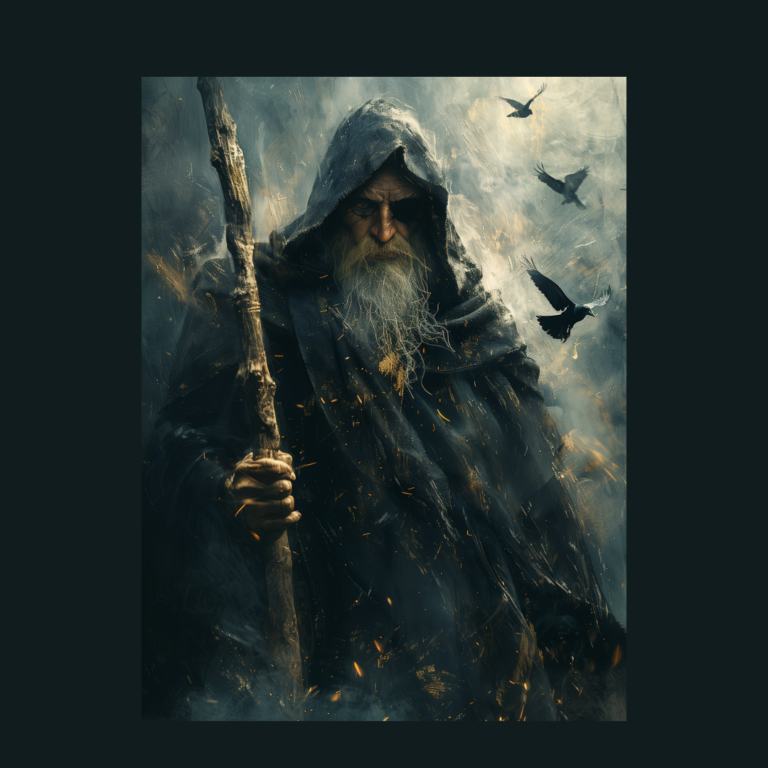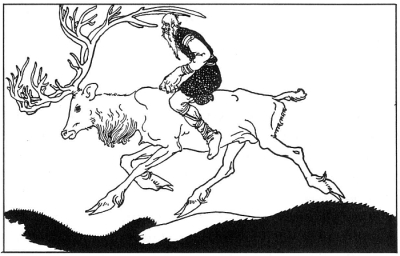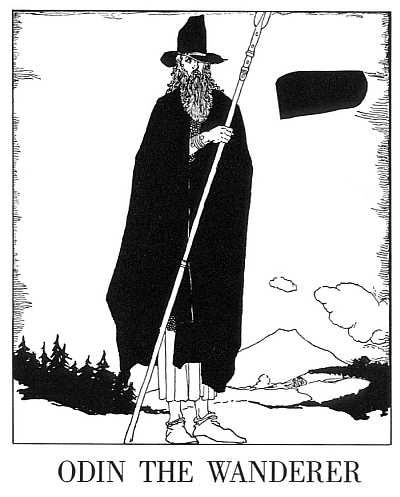Urda’s Well

THE ALL-FATHER’S FOREBODINGS:
HOW HE LEAVES ASGARD
“Two ravens had Odin All-Father; Hugin and Munin were their names; they flew through all the worlds every day, and coming back to Asgard they would light on Odin’s shoulders and tell him of all the things they had seen and heard. And once a day passed without the ravens coming back. Then Odin, standing on the Watch-Tower Hlidskjalf, said to himself:
I fear me for Hugin,
Lest he come not back,
But I watch more for Munin.
“A day passed and the ravens flew back. They sat, one on each of his shoulders. Then did the All-Father go into the[Pg 70] Council Hall that was beside Glasir, the wood that had leaves of gold, and harken to what Hugin and Munin had to tell him.
“They told him only of shadows and forebodings. Odin All-Father did not speak to the Dwellers in Asgard of the things they told him. But Frigga, his Queen, saw in his eyes the shadows and forebodings of things to come. And when he spoke to her about these things she said, “Do not strive against what must take place. Let us go to the holy Norns who sit by Urda’s Well and see if the shadows and the forebodings will remain when you have looked into their eyes.”
“And so it came that Odin and the Gods left Asgard and came to Urda’s Well, where, under the great root of Ygdrassil, the three Norns sat, with the two fair swans below them. Odin went, and Tyr, the great swordsman, and Baldur, the most beautiful and the Best-Beloved of the Gods, and Thor, with his Hammer.
“A Rainbow Bridge went from Asgard, the City of the Gods, to Midgard, the World of Men. But another Rainbow Bridge, more beautiful and more tremulous still, went from Asgard to that root of Ygdrassil under which was Urda’s Well. This Rainbow Bridge was seldom seen by men. And where the ends of the two rainbows came together Heimdall stood, Heimdall with the Golden Teeth, the Watcher for the Gods, and the Keeper of the Way to Urda’s Well.
“Open the gate, Heimdall,” said the All-Father, “open the gate, for today the Gods would visit the holy Norns.”
“Without a word Heimdall opened wide the gate that[Pg 71] led to that bridge more colored and more tremulous than any rainbow seen from earth. Then did Odin and Tyr and Baldur step out on the bridge. Thor followed, but before his foot was placed on the bridge, Heimdall laid his hand upon him.
“The others may go, but you may not go that way, Thor,” said Heimdall.
“What? Would you, Heimdall, hold me back?” said Thor.
“Yes, for I am Keeper of the Way to the Norns,” said Heimdall. “You with the mighty hammer you carry are too weighty for this way. The bridge I guard would break under you, Thor with the hammer.”
“Nevertheless I will go visit the Norns with Odin and my comrades,” said Thor.
“But not this way, Thor,” said Heimdall. “I will not let the bridge be broken under the weight of you and your hammer. Leave your hammer here with me if you would go this way.”
“No, no,” said Thor. “I will not leave in any one’s charge the hammer that defends Asgard. And I may not be turned back from going with Odin and my comrades.”
“There is another way to Urda’s Well,” said Heimdall. “Behold these two great Cloud Rivers, Körmt and Ermt. Canst thou wade through them? They are cold and suffocating, but they will bring thee to Urda’s Well, where sit the three holy Norns.”‘
“Thor looked out on the two great rolling rivers of cloud. It was a bad way for one to go, cold and suffocating. Yet if he went that way he could keep on his shoulder the[Pg 72] hammer which he would not leave in another’s charge. He stept out into the Cloud River that flowed by the Rainbow Bridge, and with his hammer upon his shoulder he went struggling on to the other river.
‘Odin, Tyr, and Baldur were beside Urda’s Well when Thor came struggling out of the Cloud River, wet and choking, but with his hammer still upon his shoulder. There stood Tyr, upright and handsome, leaning on his sword that was inscribed all over with magic runes; there stood Baldur, smiling, with his head bent as he listened to the murmur of the two fair swans; and there stood Odin All-Father, clad in his blue cloak fringed with golden stars, without the eagle-helmet upon his head, and with no spear in his hands.
“The three Norns, Urda, Verdandi, and Skulda, sat beside the well that was in the hollow of the great root of Ygdrassil. Urda was ancient and with white hair, and Verdandi was beautiful, while Skulda could hardly be seen, for she sat far back, and her hair fell over her face and eyes. Urda, Verdandi, and Skulda; they knew the whole of the Past, the whole of the Present, and the whole of the Future. Odin, looking on them, saw into the eyes of Skulda even. Long, long he stood looking on the Norns with the eyes of a God, while the others listened to the murmur of the swans and the falling of the leaves of Ygdrassil into Urda’s Well.
Looking into their eyes, Odin saw the shadows and forebodings that Hugin and Munin told him of take shape and substance. And now others came across the Rainbow Bridge. They were Frigga and Sif and Nanna, the wives[Pg 73] of Odin and Thor and Baldur. Frigga looked upon the Norns. As she did, she turned a glance of love and sadness upon Baldur, her son, and then she drew back and placed her hand upon Nanna’s head.
“Odin turned from gazing on the Norns, and looked upon Frigga, his queenly wife. “I would leave Asgard for a while, wife of Odin,” he said.
“Yea,” said Frigga. “Much has to be done in Midgard, the World of Men.”
“I would change what knowledge I have into wisdom,” said Odin, “so that the things that are to happen will be changed into the best that may be.”
“You would go to Mimir’s Well,” said Frigga.
“I would go to Mimir’s Well,” said Odin.
“My husband, go,” said Frigga.
“Then they went back over that Rainbow Bridge that is more beautiful and more tremulous than the one that men see from the earth; they went back over the Rainbow Bridge, the Æsir and the Asyniur, Odin and Frigga, Baldur and Nanna, Tyr, with his sword, and Sif beside Tyr. As for Thor, he went struggling through the Cloud Rivers Körmt and Ermt, his hammer Miölnir upon his shoulder.
“Little Hnossa, the youngest of the Dwellers in Asgard, was there, standing beside Heimdall, the Watcher for the Gods and the Keeper of the Bridge to Urda’s Well, when Odin All-Father and Frigga, his Queen, went through the great gate with heads bent. “Tomorrow,” Hnossa heard Odin say, “tomorrow I shall be Vegtam the Wanderer upon the ways of Midgard and Jötunheim.”
PART II
ODIN GOES TO MIMIR’S WELL:
HIS SACRIFICE FOR WISDOM

“And so Odin, no longer riding on Sleipner, his eight-legged steed; no longer wearing his golden armor and his eagle-helmet, and without even his spear in his hand, traveled through Midgard, the World of Men, and made his way toward Jötunheim, the Realm of the Giants.
“No longer was he called Odin All-Father, but Vegtam the Wanderer. He wore a cloak of dark blue and he carried a traveler’s staff in his hands. And now, as he went toward Mimir’s Well, which was near to Jötunheim, he came upon a Giant riding on a great Stag.
“Odin seemed a man to men and a giant to giants. He[Pg 78] went beside the Giant on the great Stag and the two talked together. “Who art thou, O brother?” Odin asked the Giant.
“I am Vafthrudner, the wisest of the Giants,” said the one who was riding on the Stag. Odin knew him then. Vafthrudner was indeed the wisest of the Giants, and many went to strive to gain wisdom from him. But those who went to him had to answer the riddles Vafthrudner asked, and if they failed to answer the Giant took their heads off.
“I am Vegtam the Wanderer,” Odin said, “and I know who thou art, O Vafthrudner. I would strive to learn something from thee.”
The Giant laughed, showing his teeth. “Ho, ho,” he said, “I am ready for a game with thee. Dost thou know the stakes? My head to thee if I cannot answer any question thou wilt ask. And if thou canst not answer any question that I may ask, then thy head goes to me. Ho, ho, ho. And now let us begin.”
“I am ready,” Odin said.
“Then tell me,” said Vafthrudner, “tell me the name of the river that divides Asgard from Jötunheim?”
“Ifling is the name of that river,” said Odin. “Ifling that is dead cold, yet never frozen.”
“Thou hast answered rightly, O Wanderer,” said the Giant. “But thou hast still to answer other questions. What are the names of the horses that Day and Night drive across the sky?”
“Skinfaxe and Hrimfaxe,” Odin answered. Vafthrudner[Pg 79] was startled to hear one say the names that were known only to the Gods and to the wisest of the Giants. There was only one question now that he might ask before it came to the stranger’s turn to ask him questions.
“Tell me,” said Vafthrudner, “what is the name of the plain on which the last battle will be fought?”
“The Plain of Vigard,” said Odin, “the plain that is a hundred miles long and a hundred miles across.”
“It was now Odin’s turn to ask Vafthrudner questions. “What will be the last words that Odin will whisper into the ear of Baldur, his dear son?” he asked.
“Very startled was the Giant Vafthrudner at that question. He sprang to the ground and looked at the stranger keenly.
“Only Odin knows what his last words to Baldur will be,” he said, “and only Odin would have asked that question. Thou art Odin, O Wanderer, and thy question I cannot answer.”
“Then,” said Odin, “if thou wouldst keep thy head, answer me this: what price will Mimir ask for a draught from the Well of Wisdom that he guards?”
“He will ask thy right eye as a price, O Odin,” said Vafthrudner.
“Will he ask no less a price than that?” said Odin.
“He will ask no less a price. Many have come to him for a draught from the Well of Wisdom, but no one yet has given the price Mimir asks. I have answered thy question, O Odin. Now give up thy claim to my head and let me go on my way.”[Pg 80]
“I give up my claim to thy head,” said Odin. Then Vafthrudner, the wisest of the Giants, went on his way, riding on his great Stag.
“It was a terrible price that Mimir would ask for a draught from the Well of Wisdom, and very troubled was Odin All-Father when it was revealed to him. His right eye! For all time to be without the sight of his right eye! Almost he would have turned back to Asgard, giving up his quest for wisdom.
“He went on, turning neither to Asgard nor to Mimir’s Well. And when he went toward the South he saw Muspelheim, where stood Surtur with the Flaming Sword, a terrible figure, who would one day join the Giants in their war against the Gods. And when he turned North he heard the roaring of the cauldron Hvergelmer as it poured itself out of Niflheim, the place of darkness and dread. And Odin knew that the world must not be left between Surtur, who would destroy it with fire, and Niflheim, that would gather it back to Darkness and Nothingness. He, the eldest of the Gods, would have to win the wisdom that would help to save the world.
“And so, with his face stern in front of his loss and pain, Odin All-Father turned and went toward Mimir’s Well. It was under the great root of Ygdrassil—the root that grew out of Jötunheim. And there sat Mimir, the Guardian of the Well of Wisdom, with his deep eyes bent upon the deep water. And Mimir, who had drunk every day from the Well of Wisdom, knew who it was that stood before him.
“Hail, Odin, Eldest of the Gods,” he said.[Pg 81]
“Then Odin made reverence to Mimir, the wisest of the world’s beings. “I would drink from your well, Mimir,” he said.
“There is a price to be paid. All who have come here to drink have shrunk from paying that price. Will you, Eldest of the Gods, pay it?”
“I will not shrink from the price that has to be paid, Mimir,” said Odin All-Father.
“Then drink,” said Mimir. He filled up a great horn with water from the well and gave it to Odin.
“Odin took the horn in both his hands and drank and drank. And as he drank all the future became clear to him. He saw all the sorrows and troubles that would fall upon Men and Gods. But he saw, too, why the sorrows and troubles had to fall, and he saw how they might be borne so that Gods and Men, by being noble in the days of sorrow and trouble, would leave in the world a force that one day, a day that was far off indeed, would destroy the evil that brought terror and sorrow and despair into the world.
“Then when he had drunk out of the great horn that Mimir had given him, he put his hand to his face and he plucked out his right eye. Terrible was the pain that Odin All-Father endured. But he made no groan nor moan. He bowed his head and put his cloak before his face, as Mimir took the eye and let it sink deep, deep into the water of the Well of Wisdom. And there the Eye of Odin stayed, shining up through the water, a sign to all who came to that place of the price that the Father of the Gods had paid for his wisdom.” Padraic Collum. The Children of Odin: The Book of Northern Myths.
-
Wishing wells
People used wishing wells for divination, throwing coins in and reading the patterns as signs from the gods. Some wells were thought to have healing powers, and people would drink or bathe in the water to cure diseases.
-
Holy wells
In Celtic mythology, holy wells were thought to originate in the Otherworld, and waters flowed from them into our world as springs and rivers.
-
Connla’s Well
In Irish mythology, Connla’s Well is a well in the “Celtic Otherworld” that is also known as “The Well of Wisdom” or “The Well of Knowledge”. It is the mythical source of the River Shannon.
-
The Secret WellIn Irish mythology, the Secret Well is the mythical source of the River Boyne. It is also known as Nechtan’s Well or the Well of Segais.
Discover more from Jacki Kellum
Subscribe to get the latest posts sent to your email.
